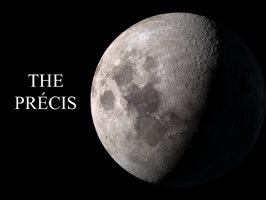 As part of the new partnership between SpaceWatch Middle East and The Précis, a quarterly space law and policy report produced by Space Law & Policy Solutions, run by the prominent space lawyer and friend of SpaceWatch Middle East, Michael J. Listner, SpaceWatch Middle East is occasionally publishing select articles from The Précis. Reproduced here are Michael’s analysis of the UAE National Space Policy from a Special Issue XV of The Précis from June 5, 2017. Details of how to subscribe to The Précis are provided at the end of this commentary.
As part of the new partnership between SpaceWatch Middle East and The Précis, a quarterly space law and policy report produced by Space Law & Policy Solutions, run by the prominent space lawyer and friend of SpaceWatch Middle East, Michael J. Listner, SpaceWatch Middle East is occasionally publishing select articles from The Précis. Reproduced here are Michael’s analysis of the UAE National Space Policy from a Special Issue XV of The Précis from June 5, 2017. Details of how to subscribe to The Précis are provided at the end of this commentary.
Details of how to subscribe to The Précis are provided at the end of this commentary.
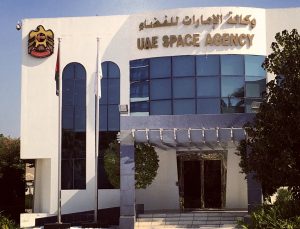
The United Arab Emirates revealed details of its National Space Policy during the 56th Session of the Legal and Subcommittee meeting in Vienna March 27-April 7, 2017. The presentation, which was given by Naser Al-Rashedi of the Space Policy and Regulations Directory of the UAE Space Agency, is the first substantive look of the Policy the UAE has proffered to the public. The following summation is aggregated from the presentation made on April 6, 2017 and is intended to supplement the previous analysis of the UAE National Space Policy published the 3rd Quarter 2016 (Issue IV) of The Precis on September 2, 2016.
The UAE National Policy articulates five fundamental purposes to facilitate the UAE Government’s intentions for the space sector to include its citizens, industry, the international community and other stakeholders.[1]
How the space sector will contribute to the achievement of the UAE’s national vision, priorities and goals.[2]
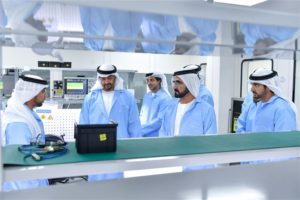
The first purpose of the Policy is to articulate the principles or the reason why the UAE is developing the space sector. There are five principles under this heading:
- To enhance the lives of the UAE’s citizens. The UAE will accomplish this through national knowledge about the universe, enhancement of educational and scientific studies and research, provide better services, and to promote a culture of innovation and be a source of national pride.[3]
- To support national interests. National interests of the UAE include: “safety, security and stability; disaster and crisis management; discovery and management of natural resources; urban planning and roads planning; climate monitoring; and environment protection, monitoring and management.”[4]
- To support growth and diversification of the UAE economy. This principle addresses the development and growth of the UAE’s national space capabilities and its capacities to contribute to the national economy and to ensure those capabilities and capacities can respond to needs of other sectors for space technologies and applications.[5]
- To promote collaboration and support the status of the UAE. This principle addresses the cooperation, coordination and partnerships at national and international levels in the space domain to support the status of the UAE. This principle envisions collaboration to occur between the government and private sectors, academia, and research and development centers.[6]
- To respect international law. This principle enunciates the ideal to recognize the right of all nations to explore and use space for peaceful purposes and for the benefit of humanity. To that end, the UAE considers it a vital national interest to maintain a safe, sustainable and stable space environment, free from impediments to access and utilization.[7]
The Government’s ambition and goals for the space sector.
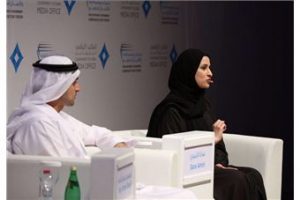
The second purpose of the Policy is to articulate the five goals the UAE anticipates to accomplish in the space sector. The goals of the National are as follows:
- Expand the utilization of space to protect and support vital sectors – The first goal of the Policy is to build diverse capabilities of strategic national interest such as. These strategic national interests include: national security; disaster and crisis management; education and research; public health; telecommunications and broadcasting; transportation and logistics; and other vital national functions.[8]
- Develop a sustainable, competitive and innovative commercial space industry – The second goal of the Policy is to build, develop and sustain an active, diversified commercial space industry. To facilitate this, the UAE will engage a variety of measures, including enacting economic incentives, legislating a regulatory environment that will attract foreign investment; encourage entrepreneurship and innovation; develop domestic national space professionals and provide an environment conducive for basic and applied research and development.[9]
- Conduct scientific space missions – The third goal of the Policy seeks to promote space-related scientific programs and projects. This includes the planning and execution of both sole and cooperative space missions; the procurement and development of capabilities for space exploration and earth observation; the encouragement of scientific research and development of programs, which will strengthen and utilize the UAE’s space capabilities and technology.[10]
- Promote a safe and stable space environment – The fourth goal of the Policy desires to enhance the sustainability of space activities by supporting national and international efforts related to the International Telecommunications Union (ITU), including the planning for access to and efficient use of radiofrequency spectrum and geosynchronous orbital slots. The UAE also intends to promote space operations and activities through…“transparency, openness, coordination and information operations and activities; safety and security of space activities and environment; space debris mitigation; and space situational awareness.”[11]
- Establish and expand the UAE’s leadership in space – The fifth and final goal of the proposes to establish and increase the UAE’s regional presence in the Middle East and its international presence through collaboration and partnerships. The UAE will facilitate this increase in influence by focusing on supporting initiatives in the peaceful use of outer space; the development of space capabilities, including capabilities specific to disaster management and relief, telecommunications, navigation, land observation, and scientific, and technological and space exploration programs.[12]
Define the ecosystem of enabling capabilities needed to support the space sector.
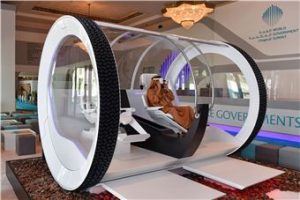
The third purpose of the Policy is to identify capabilities and competencies needed to support the space sector. Eight “enablers” are contained in the Policy to facilitate the UAE’s space sector goals and ambitions, which identify the competencies required to attain the goals set forth.
- Awareness of the importance of space and its activities – The first enabler acknowledges the need for the UAE to develop programs to increase national awareness within the UAE and the importance of space and its different uses. This includes the importance of national, regional and global space activities; the latest developments and achievements of space exploration; and national and international policies, laws, regulations and measures related to the regulation of space.[13]
- Qualified UAE Space Professionals – The second enabler identifies the need for the development and implementation of programs that will increase student participation STEM programs and attract talent and skilled professionals in the Emirates to work in the space sector. The second enabler is also recognizes the need to develop, retain, and increase opportunities for skilled space professionals within the UAE. Signifcantly, the second enabler is designed to provide, incentivize and enable the increased participation of women in the space workforce.[14] This enabler not only recognizes the contributions of women to the UAE’s space industry, but also represents the UAE’s shift towards modernization in the Middle East.
- Effective and Attractive Space Regulatory Environment – The third enabler recognizes the need to incorporate and develop domestic space laws and regulations. These laws and regulations will be required to increase transparency, effectiveness, and resilience, and also provide protection of intellectual property rights as well as provide insurance policies and facilities for various private space activities. The legal and regulatory environment created through the third enabler will simplify the sharing of appropriate data and information to support value-added industries. The environment envisioned by the third enabler will strive to require the minimum regulatory burden on commercial space activities to enable the UAE to comply with its domestic and international legal obligations.[15] That another country like the UAE might offer a more effective and attractive foreign legal and regulatory environment has been used to great effect in lobbying efforts in the United States and has prompted the both the House and Senate to reevaluate the U.S. commercial space licensing scheme.[16]
- Active Management of Radiofrequency and Satellite Orbital Resources – The fourth enabler focuses attention on the needed for radio spectrum management and allocation of allotted geosynchronous slots for the present and future. The fourth enabler makes cognizant the need for the UAE to support international cooperation and research and technology to facilitate the efficient and sensible use of limited radiofrequency spectrum and geosynchronous orbital slots. The fourth enabler also recognizes the necessity for the UAE to develop capabilities to counter radiofrequency interference.[17]
- Effective Science, Technology and Innovation Programs – The fifth enabler recognizes the necessity for the UAE to establish programs to encourage and conduct basic and applied research in the field of space science and technology. These programs will support the space sector by developing space-related capabilities, reducing costs of space goods and services, developing next-generation space technologies; encouraging innovation and entrepreneurship; and extending the use and benefits of space technology and applications.[18]
- National, Regional and Global Collaborations, Coordination and Partnerships – The sixth enabler identifies the need to coordinate national efforts to foster effective collaboration among all stakeholders in public, private, academic and educational sectors and R&D sectors in the UAE. The sixth enabler also necessitates the UAE to promote regional and international collaboration and partnerships with other space agencies, research centers, universities, academic institutions and companies.[19]
- Adequate Investment and Financial Support – The seventh enabler recognizes the need to develop financing mechanisms to fund national government & scientific space projects. The seventh enabler appreciates the requirement for suitable measures and procedures to be created that will facilitate access to financing options for commercial space companies in all stages of development and requires the enactment of funding provisions or investment decisions to support companies and private individuals working in the domestic space sector.[20]
- Supporting Facilities and Infrastructure – The eighth and final enabler acknowledges the need to create facilities and infrastructure the space sector. This includes the development and manufacture of critical space technologies, applications and services; the coordination of various national efforts to minimize costs and avoid redundancy; to evaluate and improve the level of effectiveness of space infrastructure security and protection, and the enhancement of connectivity and interoperability.[21]
Provide guidance to national organizations regarding their role and contribution.
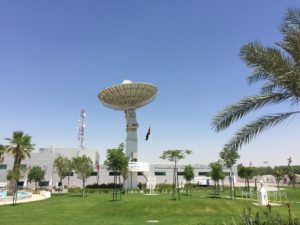 The fourth purpose of the Policy is to provide national organizations with guidance specific to their role and contribution to the space sector. This is accomplished through the Guidelines of the space policy, which provide direction for activities required to support and develop the sector. The Policy focuses on three main guidelines: National functions guidelines, science, technology and exploration guidelines and commercial sector guidelines. Each will be addressed below.
The fourth purpose of the Policy is to provide national organizations with guidance specific to their role and contribution to the space sector. This is accomplished through the Guidelines of the space policy, which provide direction for activities required to support and develop the sector. The Policy focuses on three main guidelines: National functions guidelines, science, technology and exploration guidelines and commercial sector guidelines. Each will be addressed below.
- National functions – This guideline directs stakeholders in the UAE to provide support to national security capabilities of the UAE, to enhance proficiencies for disaster monitoring and response; support national activities in humanitarian aid; provide support to key UAE industries, apply space technology to improve the quality of life of UAE people. This guideline also directs stakeholders to support national capabilities for management of natural resources, initiatives for smart cities and e-government and international efforts for promotion of sustainable space activities.[22]
- Science, technology and exploration – The science, technology and exploration guideline has five directives for stakeholders in the space sector: to develop and encourage UAE scientific and aerospace engineering professionals; to enhance land and climate observation and support environment protection, to support the development of national space technology, create programs that support the UAE’s space exploration efforts , and become involved in space programs, which increase the prestige of the UAE’s in this field.[23]
- Commercial sector guidelines – The commercial sector guidelines charge space sector stakeholders with six directives: To promote UAE space products and services, to support the broadening and progress of new economic markets , to create a domestic space industry that is competitive and sustainable, to encourage innovation and maintain it, to foster an environment for creative entrepreneurship and commercial space projects , and to support the development of standards for the space industry.[24]
Implementation and governance – success factors.
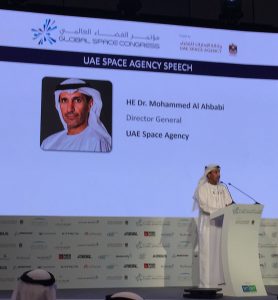
The final purpose of the National Space Policy identifies four fundamental success factors required for the space policy’s successful execution: Effective stewardship by the UAE Space Agency, Active stakeholder involvement and coordination, Assessment to identify gaps and opportunities and Review and revision of the Space policy.[25]
- Effective stewardship by the UAE Space Agency – The Policy recognizes to be successful implementation requires the UAE Space Agency to be an effective curator. The Policy identifies key responsibilities for the UAE Space Agency to facilitate its role as steward, including its responsibility to raise awareness among national stakeholders, develop and coordinate a strategy and implementation plan for the Policy, direct specific tasks and delegate roles to stakeholders, monitor the progress of the space policy’s implementation, amalgamate implementation progress reports received from stakeholders and report the results to the UAE Government, and evaluate the performance of the implementation.[26]
- Active stakeholder involvement and coordination – This success factor establishes a National Committee for Oversight and Implementation. It’s duties will be to coordinate the implementation of the Policy and Strategy, [27]to implement the initiatives and projects of the space policy, manage and report on the progress of implementation, identify strengths, weaknesses, and areas where future improvement can be made, and to make recommendations where and when appropriate.[28]
- Assessment to identify gaps and opportunities – The next success factor will identify deficiencies and prospects for the space policy. This factor will look for core competencies and curricula Emirati space professionals require for their development, ascertain space technologies and/or programs needed, opportunities for future science and exploration missions whether solely or in cooperation with other parties, the potential to establish competitions and prizes that will encourage innovation, the prospects for global collaboration and partnership opportunities with other nations, identifying potential improvements in facilities and infrastructure for the space sector, and potential improvements in the domestic legal and regulatory scheme.[29]
- Review and revision of the Space Policy – The UAE Space Agency will review the National Policy every five years or whenever it is deemed necessary. The review of the Policy intended to keep the Policy up to date with developments in the global and domestic sphere and trends in the outer space arena. The UAE Space Agency is also tasked to identify and recommend improvements to the Policy that might be required.[30]
Thoughts About the UAE Space Policy
The presentation of the UAE National Space Policy does not appear to be a complete representation of the actual Policy. However, from what is disseminated by the presentation at the 56th Session, some observations can be extrapolated.
- The UAE National Space Policy appears to be a general blueprint for the UAE’s vision of what its role will be in the Middle East and the international community.
- The Policy recognizes the need for and articulates general principles, goals, an assessment of resources needed to facilitate those goals, general directives to accomplish those goals and a means to measure whether those goals are being accomplished.
- It is clear the UAE Space Agency is the focal point for the Policy and through the Space Agency other sectors both that have outer space interests will coordinate with the Space Agency to develop their own internal policies and strategies.
- The Policy is decidedly focused on civil and commercial space activities. It appears from the Principles the Ministry of Defense will interact with the Space Agency for purposes of the Policy, but it is unclear if the Ministry substantially influenced the Policy’s creation. Whether this is an oversight or intentional is unclear as the presentation on the Policy does not give an indication of what political machinations might have gone on behind the scenes during the Policy’s creation.
- A policy dealing with the national security aspects of outer space may be a stand-alone policy or strategy. It would make sense such a policy or strategy must be created considering the UAE’s acquisition of two optical reconnaissance satellites and the capability they will give the UAE. [31] More critically, with the resurgence of Iran as a Middle East power, the UAE would want to coordinate both its cyber and outer space capabilities with that of its neighbors in the region and with Western forces in the event hostilities break out. This would require a policy and/or strategy to create the authorization necessary to facilitate such coordination.
Bottom Line
From what can be gleaned from the presentation, the UAE National Space Policy appears to be a respectable step to facilitate the growth of the UAE space sector. Even though the Policy itself has yet to be released in a public version, that the UAE took the effort to create and approve a formal Policy creates optics of a sophisticated and coordinated effort to create a vibrant space sector. Whether that remains true beneath the veneer of those optics remains to be seen, but one thing is certain: the United Arab Emirates is setting itself up to become the epicenter of outer space activities in the Middle East and a player in the international space arena.
——–
[1] See UAE National Space policy, Agenda Item 11, LSC 2017, 06 April 2017, p. 4, available at http://www.unoosa.org/documents/pdf/copuos/lsc/2017/tech-08.pdf.
[2] See Id. at p. 6.
[3] See Id.
[4] See Id.
[5] See Id.
[6] See Id.
[7] See Id.
[8] See Id. at p. 7.
[9] See Id.
[10] See Id.
[11] See Id.
[12] See Id.
[13] See Id. at p. 8
[14] See Id.
[15] See Id.
[16] The proposed American Space Free Enterprise Act is a result of this concern. The proposed Act would fundamentally alter not only the way private space activities are “authorized” in the United States but will also alter customary interpretations of international space law. The draft of the proposed Act can be found here: https://science.house.gov/sites/republicans.science.house.gov/files/documents/2017%2006%2001%20232%20Free%20Enterprise%20Act%20HR%20Blank.pdf.
[17] See UAE National Space policy, Agenda Item 11, LSC 2017, 06 April 2017, p. 8, available at http://www.unoosa.org/documents/pdf/copuos/lsc/2017/tech-08.pdf.
[18] See Id. at p. 9.
[19] See Id.
[20] See Id.
[21] See Id.
[22] See Id. at p. 10.
[23] See Id.
[24] See Id.
[25] See Id. at p. 11.
[26] See Id.
[27] It’s unclear from the presentation what this ‘Strategy’ is and whether it has been created or is still in development.
[28] See UAE National Space Policy, Agenda Item 11, LSC 2017, 06 April 2017, p. 11, available at http://www.unoosa.org/documents/pdf/copuos/lsc/2017/tech-08.pdf.
[29] See Id.
[30] See Id.
[31] Airbus Defense and Space is constructing the two Falcon Eye high-resolution optical reconnaissance satellites for the UAE, which incorporates optics built by the U.S. The Falcon Eye satellites will be an upgraded version of the French Pléiades-HR earth observation satellites. The Falcon Eye will possess a High-Resolution Imager system that has a ground resolution of 70 cm across a 20 km swath. See Gunter’s Space Page, Falcon Eye 1,2, available at http://space.skyrocket.de/doc_sdat/falcon-eye-1.htm.
Disclaimer
The Précis is a product of Space Law & Policy Solutions. Opinion, commentary and analysis contained in The Précis is for informational purposes. The Précis is not legal advice nor is it a substitute for legal advice. Subscription to The Précis does not create an attorney/client relationship nor is information contained within protected by attorney/client privilege. The Précis may not be reproduced, distributed, or transmitted in any form or by any means, including but not limited to photocopying, edits, website uploads or other electronic or mechanical methods, except for quotations with proper citation, without the express permission of the author.
SpaceWatch Middle East thanks Michael J. Listner for permission to republish his work.
To subscribe to The Précis please visit: http://www.spacelawsolutions.com/the-pr-cis-.html
Republished at: https://spacewatch.global/2017/06/precis-uae-national-space-policy/
 SpaceWatch.Global An independent perspective on space
SpaceWatch.Global An independent perspective on space

